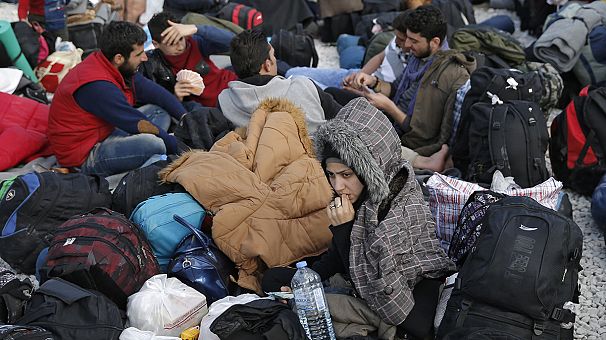EU has 10 days to see progress on migrant crisis or Schengen unravels: EU commissioner
BRUSSELS (Reuters) – European Union has 10 more days to see significantly lower inflows of migrants and refugees from Turkey “or else there is risk the whole system will completely break down”, EU Migration Commissioner Dimitris Avramopoulos said on Thursday.
Avramopoulos was speaking after the bloc’s justice and home affairs ministers met in Brussels on Thursday in an effort to put a European solution to the crisis in place. A growing number of EU states are resorting to unilateral border tightening, unraveling the continent’s free-travel Schengen zone.
The study estimated that under a worst case scenario, in which the reintroduction of controls at EU borders pushed import prices up three percent, the costs to the bloc’s largest economy Germany could be as much as 235 billion euros between 2016 and 2025, and those to France up to 244 billion.
At a minimum, with import prices rising one percent, the study showed that a breakdown of Schengen would cost the EU roughly 470 billion euros over the next decade.
The cost would climb to 1.4 trillion euros, or roughly 10 percent of annual gross domestic product (GDP) in the 28-member EU bloc, under the more dire scenario.
“If border controls are reinstated within Europe, already weak growth will come under additional pressure,” said Aart De Geus, president of Bertelsmann.
Schengen was established over 30 years ago and now counts 26 members, 22 of which are EU members. But the system of passport-free travel has come under severe pressure over the past half year due to a flood of migrants entering Europe, mainly from the Middle East and Africa.
To stem the tide and to ensure they have an overview of who is entering their territory, many countries within Schengen have reintroduced border controls in recent months, leading to fears the whole system could collapse.
Underscoring the urgency of the issue, Germany’s Interior Minister Thomas de Maiziere told public broadcaster ARD on Sunday that EU member states, which have been squabbling for months over how to tackle the migrant crisis, must agree a common approach within two weeks if they wanted to avoid such a fate.
In addition to being a devastating symbolic setback for Europe, a collapse of Schengen would increase the amount of time it takes for goods to be transported across European borders, raising costs for companies and consumers.
The Bertelsmann study, conducted by Prognos AG, estimated that the minimum costs to Germany and France would be 77 billion euros and 80.5 billion euros, respectively, over the period to 2025.
A collapse of Schengen would also increase costs for countries outside the zone, with the combined burden on the United States and China over the next decade estimated at between 91 billion and 280 billion euros, according to the study.
***
EuroNews: The EU’s migration system is on the point of complete breakdown, according to a top European Commission official.
Dimitris Avramopoulos, the European Commissioner for migration, issued the stark warning after a meeting between EU interior ministers on Thursday.
ADVERTISING“In the next ten days, we need tangible and clear results on the ground, otherwise there is a danger, there is a risk that the whole system will completely break down. There is no time for uncoordinated actions,” he told reporters in Brussels.
A number of EU countries have introduced border checks amid disagreements over how to best handle the huge influx of refugees and migrants into Europe.
Austria irked some EU officials by calling a mini summit with Western Balkan nations – without inviting Greece or Germany
The Austrian government has also set a daily cap on how migrants per day are allowed to enter the country, ignoring a warning from European Commission lawyers
“We have to recover our ability to act – and that will only be possible when the European external border is protected,” said Johanna Mikl-Leitner, the Austrian interior minister.
“If Greece stresses over and over again that it is not possible to protect the Greek border…we have to ask the question if it’s possible that the external border of the Schengen area stays in Greece.”
The Schengen area is a passport-free travel zone including 26 countries, of which 22 are EU member states.
But the migration crisis, which saw more than a million people reach Europe last year, has left some observers to question whether the whole system may be at risk.
The influx of migrants has exposed divisions between EU governments, which are trading accusations of blame and resulting beggar-thy-neighbour policies to tighten border controls.
Belgium became the seventh Schengen member on Wednesday to introduce border checks as it became clear that a court in Lille would order the partial demolition of the infamous Calais ‘Jungle’ refugee camp.

